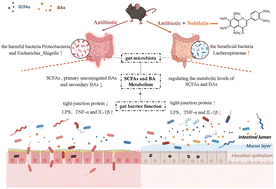Dietary nobiletin regulated cefuroxime- and levofloxacin-associated “gut microbiota-metabolism” imbalance and intestinal barrier dysfunction in mice†
Abstract
Nobiletin (NOB) exhibits significant biological activities and may be a potential dietary treatment for antibiotic-associated gut dysbiosis. In this study, mice were gavaged with 0.2 mL day−1 of 12.5 g L−1 cefuroxime (LFX) and 10 g L−1 levofloxacin (LVX) for a duration of 10 days, accompanied by 0.05% NOB to investigate the regulatory effect and potential mechanisms of NOB on antibiotic-induced intestinal microbiota disorder and intestinal barrier dysfunction. Our results indicated that dietary NOB improved the pathology of intestinal epithelial cells and the intestinal permeability by upregulating the expression of intestinal tight junction proteins (TJs) and the number of goblet cells. Furthermore, dietary NOB reduced the levels of serum lipopolysaccharide (LPS) and pro-inflammatory factors (TNF-α and IL-1β), thereby facilitating the restoration of the intestinal mucosal barrier. Additionally, dietary NOB increased the abundance of beneficial bacteria f_Lachnospiraceae and regulated the metabolic disorders of short-chain fatty acids (SCFAs) and bile acids (BAs). Notably, NOB supplementation resulted in elevated levels of butyric acid and lithocholic acid (LCA), which contributed to the repair of the intestinal mucosal barrier function and the maintenance of intestinal homeostasis. Collectively, our results propose a healthy dietary strategy for the prevention or mitigation of antibiotic-associated gut dysbiosis by dietary NOB.



 Please wait while we load your content...
Please wait while we load your content...